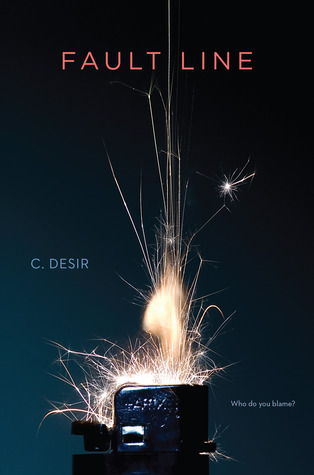
*This review will contain spoilers!*
'I thought Ani could be fixed. The pieces of her recemented so everything could be how it was. How we were. Until I saw her on her knees in front of Mr Pinter, his fingers clenched around her ponytail.'The first sentence automatically got me riled up: I hate books about people trying to fix their girlfriends, it's gross. But the rest of the paragraph shows Christa Desir pulls no punches with her writing, even if it does seem a bit too 'shock factor' for an opening.
It's love at first sight for Ben "Beez" Baptiste and Annika, the new girl in town. He meets her once and starts obsessing about whether he's going to see her at school and if they'll have any classes together, and after two conversations she's inviting him home to meet her mother.
Their relationship starts after they've known each other for a couple of weeks and progresses rather quickly: it's less than two months before Ani tells Ben she loves him, and he - delighted that she's said it first - texts her back proclaiming that he loves her too.
Everything is going smoothly, until Ani goes with her friend Kate to an out of town party. Ben decides not to go with them: he doesn't really know anyone else attending, and he hates the kind of music that they'll be listening to, so it doesn't appeal to him.
He's meant to be meeting Ani the next day, and he's been waiting for hours for her to contact him when he gets a call from Kate, telling him he needs to get to the hospital. Ani was sexually assaulted at the party after her drink was spiked with date rape drugs, and one of her attackers left a lighter inside of her.
News travels quickly, because a couple of other students from their school were at the party. Ben goes crazy and attacks a guy who called Ani "Firecrotch", getting himself suspended, but Ani decides to become what everyone obviously thinks she is. Within a couple of weeks she's fooling around with the majority of the guys in school, including the faculty, despite the fact that her and Ben are still in a relationship.
There's this horrible trope in YA where a teenage girl gets raped and she automatically wants to get back on the horse, throwing herself at any boy who will look at her. I've noticed it a couple of times in the past, but it's most horrendously used in this instance. We're reading from the perspective of someone who knows the victim, and not the victim herself, and Ben uses judgmental language consistently (e.g. "slut" and "whore") even thinking of Ani with the clever nickname the bullies have crafted - "the Manhole". It sickens me.
There just doesn't seem to be any real emotion, or sympathy, throughout this novel. Ben is suspicious, doubtful and questions whether Ani was really drugged or if she was just wasted. Ani's friend Kate says "she was acting like a complete slut". If you're writing a book about a rape victim, you need a caring voice. Her support system shouldn't be slut-shaming.
The relationship between Ben and Ani is also extremely false. Because it's such obvious insta-love (she walks past at the 7-11 and he can't stop thinking about her, and then he's talking about her in terms of "the rest of my life" even though he's known her less than a month...) I couldn't get on board with it at all. It was rushed and had no substance.
Ben is a hateful character. He has no compassion, and he's selfish. Ani had planned a road trip for them to go on the next summer, and Ben actually thinks 'the rape was going to ruin this, too'. What a selfish prick.
It really did feel like most of the inclusions were purely for the shock factor. It's as though getting raped at a party isn't that bad, but getting a lighter forcibly inserted into your vagina will affect the audience. Yes, it makes the book stand out from the other novels that are dealing with rape, but standing out is not necessarily a good thing. It would have been a lot better to have less going on and write it amazingly - tenderly, because it's such a sensitive subject - rather than trying to put a horrifying spin on an event that doesn't need to be made worse.
However, I liked that the beginning linked to the end: it was a nice symmetry, and a good way to set a timeline for the novel that needed to be stuck to. It felt like a lot more than six months had passed, so the nice linking of the beginning and the end made it work perfectly as a self-contained story. The narrative established with that enigma code is the only reason this book didn't get one star. (Well, that and the fact that there's a few mentions of counselling and different ways to get help after dealing with rape, and I like any books that give advice for victims who could be potentially reading the story).
If you haven't read 'Fault Line', don't. If you want to read a book about rape and the effects that it has on the victims and their close friends and family, I'd be much more likely to recommend 'Asking For It' by Louise O'Neill, which deals with the subject in a sensitive and respectable way.






No comments:
Post a Comment